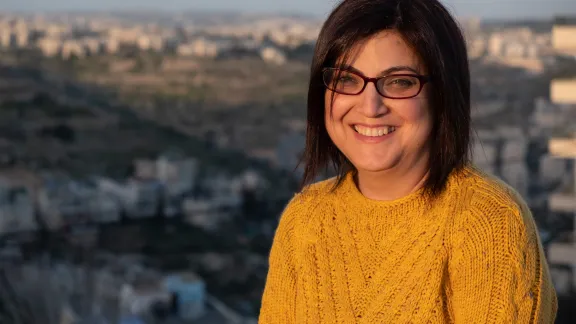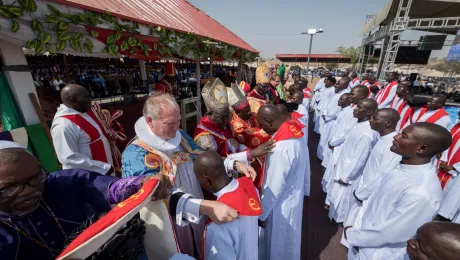
Attorney Scarlet Bishara is a judge in the Ecclesiastical Court of the Evangelical Lutheran Church in Jordan and the Holy Land (ELCJHL) and a member of the ELCJHL Church of the Reformation at Beit Jala. Photo: LWF/Ben Gray
Voices from the Communion: Judge Scarlet Bishara talks about her presence on the Lutheran Ecclesiastical Court
(LWI) - As the first woman in the Middle East serving as a judge on the church Ecclesiastical Court which governs family matters among Christians, attorney Scarlet Bishara, a member of The Evangelical Lutheran Church in Jordan and the Holy Land (ELCJHL), hopes that her presence can serve as a theological- and biblical-inspired model for other religious communities.
The Lutheran Ecclesiastical Court was granted autonomy in regulating all family affairs or personal status of its members in 2014 by the Palestinian Authority.
In 2015, five women of the ELCJHL Women’s Committee, inspired by the LWF Gender Justice Policy, challenged the ELCJHL church council to amend The Lutheran Family Laws to reflect more gender- and child-equitable outcomes. The Family Laws are the standards by which the court references cases such as divorce, inheritance, child custody, alimony, marriage age and other family affairs.
Bishara, an attorney of general law in Palestine, was one of those five women and today talks about how her presence on the court fosters trust and a welcome familiarity for women seeking justice.
Please tell us more about the Lutheran Ecclesiastical Court?
In Palestine, legal cases concerning the family are handled by the religious community. Outside of the Islamic Sharia court, there are four Christian Ecclesiastical courts: the Catholic, the Anglican, the Orthodox and the Lutheran courts. Each of these denominations has its own law.
Each has a unique set of personal status laws and a court process to govern family cases. However, religious laws applied in Palestine and in the Middle East are among the most challenging obstacles to the advancement of gender justice. This is what the Women’s Committee realized years ago when it brought the proposal of Lutheran Family Laws before the church council. Typically, family laws in the courts are discriminative in all matters related to marriage, divorce, and child custody. Historically, these laws gave legal power for men to control the fate of their wives at home and in society.
But “the Lutheran Family Law” provides a sustainable framework for answering questions raised about how to rectify gender imbalances in the personal status laws in Palestine that are still promoted by religious institutions of all faith backgrounds.
The Lutheran World Federation Gender Justice Policy helped us as a church to understand the theological arguments in a focused manner and how the Bible and teachings of Jesus support gender equality. We examined the arguments from a Palestinian perspective to help us consider the guidance within our own context, focusing on equality between both men and women.
I believe the religious communities in Palestine are uniquely positioned to champion the rights of women in Palestine.
For example, in 2015 the Lutheran Family Law was amended to increase the age that a girl can be married from 14 years old to 18 years old, to specify that each spouse has the right to terminate their marriage, to afford equal financial support and custody of children in divorce cases and state all children (male and female) of deceased parents are entitled to equal inheritance. These are the changes made to protect girls in society.
How do women bring a case to the Ecclesiastical Court?
Because of the culture, when a case reaches the ecclesiastical court it is usually the last resort for a family, especially for women. Most of the time the women come to the courts after consulting the family, their fathers, and their pastors. Often, they continue to face suffering because usually, particularly in the case of the Catholic and some Orthodox churches, they are judged by unmarried men – priests.
And as an unmarried man, it is difficult for them to understand the situation of women.
Typically, most of the men will place the blame on the wife first, saying, ‘she didn’t cook well, and made her husband angry. She didn’t raise the children well, or she didn’t satisfy her husband, therefore, he beat her.’ This is the cultural norm that we face in the Middle East.
But as a woman judge I hear the women, I understand them. I am trusted with their stories because I am a woman.
I also understand the consequences of not listening to women. In the past, many were turned away and told to ‘be patient’ or to ‘give their husband another chance,’ which has led to women and children being badly hurt by domestic violence.
Who else sits on the court with you and how do they accept your role?
I was appointed in 2015 to a lifetime seat on the court and I serve with two ELCJHL pastors and head of the court, ELCJHL Bishop Sani Ibrahim Azar. Everyone respects my insights, supports my position as judge, and accepts my decisions on cases, fully.
Bishop Azar has given his blessings to continue the progressive work of gender equality within the church and recently, he and the church council appointed another woman to the ELCJHL appeals court. She hasn’t begun her work, yet.
Today, the Women’s Committee of which I remain a member is working together, male and female, to keep gender equality at the forefront of the ELCJHL mission. There are plans for a documentary to be released on 2 December about the progress of gender justice in the ELCJHL and the Lutheran Family Law.
The church council, the synod and the elders, the three governing bodies of the ELCJHL, would like to elect a woman to the Church Council for the first time. The Women’s Committee has hosted many conferences and meetings to encourage women to enter as candidates in the election.
Why did you choose law and what efforts have you made outside of the court to defend the rights of all people?
Being an idealist when I was young, I wanted to be a lawyer, one who was defending the innocent and restoring rights to their rightful owners.
I do what I can to uphold that dream. Recently, I facilitated a series of awareness sessions for Christian women of all denominations on “Gender justice and Personal Status Law of Churches” and how it can be improved for social societies and nonprofit organizations. I conducted a series of sessions for ELCJHL women on the same topic and a session on “Women, Children and Human Rights for Youth” for the Christian churches and at the Scouts headquarters of the Catholic Church.
In March of 2019, you spoke at the UN Bureau of the Commission Committee on the Elimination of All Forms of Discrimination against Women (CEDAW). What was your topic?
Yes, I spoke at a side event organized by the Lutheran World Federation (LWF) and the Church of Sweden, on the topic of “Religious Actors Promoting Gender Equality Through Personal Status Laws in Palestine” as a social protection system.
In that presentation, I talked about my excitement for the future possibilities for ELCJHL gender policy and that my hope was to see one ecumenical law for all Christians that upholds justice for all women.
Overall, I believe that because of the dual court systems in the Middle East, civil and religious, it is the religious community that will be the leaders in a just system for women.
Change in the Arab world is in the hands of the faith leaders, but change is slow. Many churches are looking up to our church and they would like to change, especially the women, but the clergy and the patriarchal society are not easy to convince.
What does it mean for your church, your work, for you to be a part of the communion of churches?
I am proud to be a part of ELCJHL that practices what it preaches - gender justice. My work as a judge and as a gender justice activist is a source of joy for me. I appreciate the work the LWF does all over the world in that field and I am honored to have represented my church in LWF and UN forums on the topic.
LWF/A.Gray
The Lutheran World Federation is a global body that shares the work and love of Christ in the world. In this series, we profile church leaders and staff as they discuss topical issues and set out ideas for building peace and justice in the world, ensuring the churches and communion grow in witness and strength.


